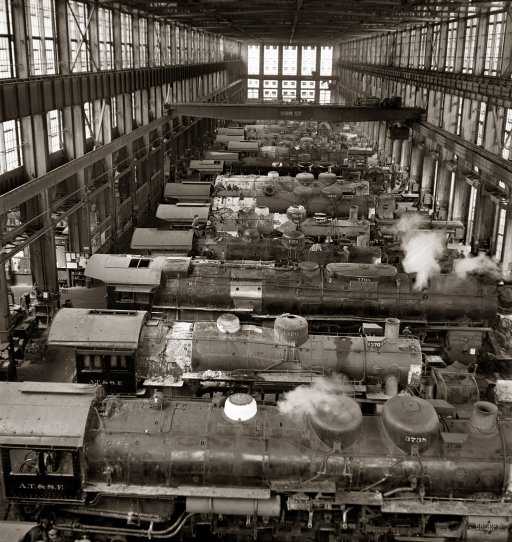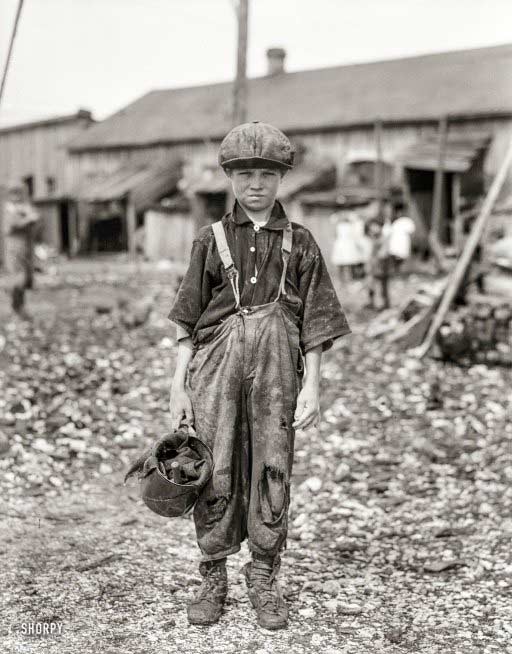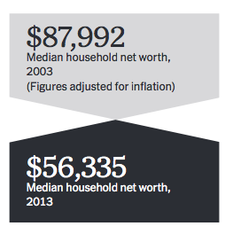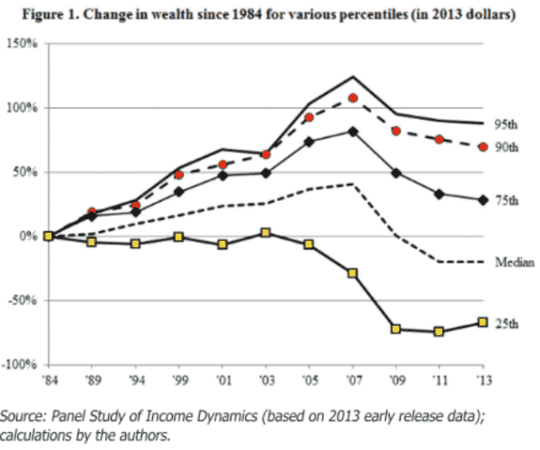
Pablo Picasso Portrait of the artist’s mother 1896 (he was 15)



Tucker
.@TuckerCarlson Defends J6 Prisoners, Says the 2020 Election Was 'Obviously' Stolen
"They [J6 protestors] were there because they believe in the system because they all have pocket constitutions. They thought it was real, and they were so shocked to see their election stolen,… pic.twitter.com/67omifqtJk
— The Vigilant Fox 🦊 (@VigilantFox) December 19, 2023
. @Timcast: "Would you vote for Trump if he chose Nikki as VP?"@TuckerCarlson: "I would not only not vote for that ticket, I would advocate against it as strongly as could. Here's someone who's actively opposed to the interests of the country I grew up in … [and] is a… pic.twitter.com/KfPdj2PcLy
— The Vigilant Fox 🦊 (@VigilantFox) December 19, 2023
TUCKER CARLSON: "They [the media] hate you, and they want to hurt you."
"You watch these people from January 6th go to prison who didn't do anything wrong, and it destroys their lives. And the media cheerlead it," @TuckerCarlson continued.
"So, if they're happy to see Ashli… pic.twitter.com/5bIHE7RzJI
— The Vigilant Fox 🦊 (@VigilantFox) December 18, 2023

Water vs fire
Water 💦 vs Fire🔥 pic.twitter.com/EaDsrVxCet
— Science (@ScienceGuys_) December 18, 2023


Blair-Bush initiative..
• They Can Wait at Leisure, Whilst Netanyahu Labours – and Errs (Alastair Crooke)
In a small dimly lit room in Gaza, it was possible to discern first the museum-piece wheel chair, and then the crumpled, blanketed figure of the paraplegic figure who occupied it. Suddenly a high-pitched squeal seemed to emit from the wheelchair; it’s occupant’s hearing aid had gone wild, and was to continue to shriek at regular intervals during my visit. I wondered how much the chair-occupant could hear, with such a mal-adjusted ear-piece. Settled into discussion, I realised that disabled or not, his mental state was sharper than a knife. He was as tough as nails; had a dry humour and his eyes perpetually sparkled. He was clearly enjoying himself – except when wrestling with the whistles and shrieks from his hearing aid. How was it that such charisma was packed within such a slight figure? This man in the wheelchair and with the rickety earpiece – Sheikh Ahmad Yasin – was the founder of Hamas. And what he said to me that morning has come to upend the Islamic world today.
What he said was: “Hamas is not an Islamic movement. It is a liberation movement, and anyone, be they Christian, or Buddhist – or even I – could join it. We all were welcome”. Why was this simple formula somehow so significant and connected to today’s events? Well, the ethos of Gaza, at that time (2000-2002), was predominantly that of ideological Islamism. The Egyptian Muslim Brotherhood was deeply embedded. It was not then a resistance movement per se – it was capable of violence, but its prime focus was social work and uncorrupted governance. It wanted to show how well it could govern. Yasin’s comment was revolutionary because liberation trumped dogma and the various ‘schools’ of political Islam. This ultimately was to become ‘Gaza Hamas’ – at odds with its conventional leadership resident in Doha. Sinwar and Dief are ‘Yasin’s children’.
‘Long story short’, a little while later, Yasin, on one of his Friday prayers’ wheel-chair trundles across the road to his adjacent mosque, was blown to pieces by an Israeli missile as he exited. The Muslim Brotherhood wing of Hamas did get their chance to show their hand at governance: They (fairly) won the 2006 Palestinian Authority elections in Gaza, and took a majority of seats – some in the West Bank too. President Bush and Condaleeza Rice were horrified. They had supported the elections … but they never once imagined …Thus, PM Blair and President Bush put together a secret (unacknowledged to the EU) plan in response: Hamas leaders – plus the movements’ social support NGOs – were to be eliminated.
And the Palestinian Authority would crack down on all and every Hamas activity – in close collaboration with Israel. The West Bank, in this plan, would be the recipient of large financial aid to construct a prosperous western-style consumer/security state, and Gaza explicitly was to be impoverished. It would be made to ‘stew in its own juices’ under 16 years of siege; to wallow in poverty. The Israelis gave the Blair plan its empirical basis – calculating exactly how many calories, per head, how much fuel and gas would be allowed to enter Gaza – that would just maintain a subsistence standard of living. And since this Blair-Bush initiative, Palestinians have been irredeemably divided, with no political project even faintly possible.

Operation Prosperity Guardian..
• US Prepares Its Ukraine War Coalition Fleet In The Red Sea (Helmer)
On Monday, General Lloyd Austin, the US Secretary of Defense, announced that the US is assembling a fleet of warships to defend Israel’s port of Eilat, the Gulf of Aqaba, and Israel’s Red Sea shipping route by threatening to attack Yemen if it exercises its Law of the Sea right to regulate military transit through the Bab el-Mandeb Strait. The Austin fleet is to be assembled from the coalition of NATO states at war with Russia in the Ukraine. Austin’s call, announced by the Pentagon while Austin is in Israel, follows the failure of the USS Eisenhower and its squadron, with additional French and British warships, to prevent the collapse of commercial container and tanker shipping to and from Israel. “The recent escalation in reckless Houthi attacks originating from Yemen,” Austin announced, “threatens the free flow of commerce, endangers innocent mariners, and violates international law.
“The Red Sea is a critical waterway that has been essential to freedom of navigation and a major commercial corridor that facilitates international trade. Countries that seek to uphold the foundational principle of freedom of navigation must come together to tackle the challenge posed by this non-state actor launching ballistic missiles and uncrewed aerial vehicles (UAVs) at merchant vessels from many nations lawfully transiting international waters.” “This is an international challenge that demands collective action. Therefore, today I am announcing the establishment of Operation Prosperity Guardian, an important new multinational security initiative under the umbrella of the Combined Maritime Forces and the leadership of its Task Force 153, which focuses on security in the Red Sea.
Operation Prosperity Guardian is bringing together multiple countries to include the United Kingdom, Bahrain, Canada, France, Italy, Netherlands, Norway, Seychelles and Spain, to jointly address security challenges in the southern Red Sea and the Gulf of Aden, with the goal of ensuring freedom of navigation for all countries and bolstering regional security and prosperity.” Bahrain on the Persian Gulf — the only Arab state included on Austin’s list — and the Seychelles, the island state in the Indian Ocean, are included to provide shore base facilities for the proposed Yemen-attack fleet. However, no country with naval bases on the Red Sea shore, territorial waters, and exclusive economic zones extending into the waterway — Saudi Arabia, Yemen, Egypt, Sudan, Eritrea, and Djibouti — has publicly agreed to participate or approved this escalation of the Gaza war to benefit Israel. The Pentagon has also asked the Australian Navy for a frigate to join the Red Sea fleet, but the Australian government in Canberra is reluctant to agree, and Austin has dropped the country from his list.
All of the governments on Austin’s list, with the exception of the US, voted last week at the United Nations General Assembly for Israel to halt its operations in the Gaza war. In this context, none of these states recognizes Israel’s right to impose its blockade of Gaza’s ports extending into Palestine’s territorial waters, the Gaza Maritime Area, and Israel’s de facto military rule of the international waters of the Mediterranean, including the Gaza Marine gas field. “Freedom of navigation”, Austin’s version of the legal doctrine of his Operation Prosperity Guardian, does not apply to the Gaza Maritime Area.
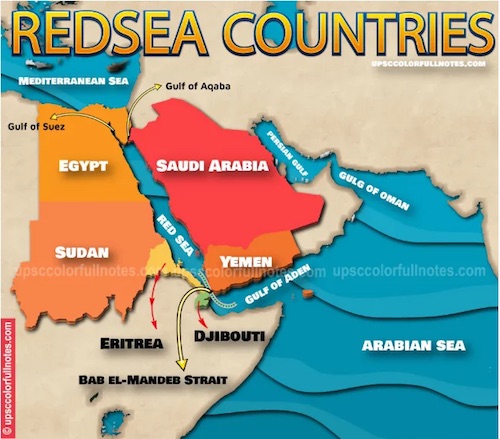

“I am the only candidate who can make this promise to you: I will prevent World War III..”
• Middle East ‘Totally Out Of Control’ – Trump (RT)
Former US President Donald Trump has claimed that the current situation in the Middle East is “out of control” and suggested that, unlike Joe Biden, he could avert looming disaster in that region and globally. Trump, who is running for a new term in office, warned that a “catastrophe” could happen in the Middle East if the situation is “not handled with strength and precision,” in comments posted on his social media platform Truth Social on Sunday. In similar remarks made during a campaign rally in Reno, Nevada, he accused the Biden administration of squandering his legacy in the form of the Abraham Accords, with which he claimed to have “made peace” in the region.
Under Trump, the US mediated a series of normalization treaties between Israel and Arab nations. Saudi Arabia was reportedly negotiating a similar arrangement when the October 7 attack by the Palestinian militant group Hamas took place. Israel’s response using overwhelming military action in Gaza has triggered mass outcry in the Muslim world, effectively making such a deal impossible for the foreseeable future. The former president is campaigning on the claim that, under his leadership, the conflict in the Middle East would not have erupted, and neither would the hostilities between Russia and Ukraine. Trump has repeatedly claimed that he could stop the latter crisis in 24 hours. With Biden left in power for another four years after the 2024 election, the world faces an existential threat, Trump told supporters in Nevada. “I am the only candidate who can make this promise to you: I will prevent World War III,” he said.
Trump’s bid to regain the presidency is being undermined by dozens of charges filed against him in several cases, including one that alleges that he sought to defraud voters in Georgia in 2020 by subverting his election loss in the state. He claims to be a victim of political persecution. Biden has been supportive of Israel’s campaign in Gaza, but this position has alienated a large portion of Democratic voters. According to pollster YouGov, as of late November, just 22% of them sympathized with Israelis more than Palestinians, compared to 14% holding the opposite view. The same metrics for Republicans were 63% and 3%, respectively. A majority of American voters would support a ceasefire in both the Middle East and the Ukraine conflicts.

“Constitution’s Article 18(3): “The exercise of the rights and freedoms of man and citizen shall not violate the rights and freedoms of other people.”
• Russian Policy Towards The Gaza War & Palestine Genocide Is Mistaken (Helmer)
In Prime Minister Benjamin Netanyahu’s national address of October 28 he erased all differences between the Jewish religion, Zionist ideology, and Israeli state policy. He invoked this trinity in the “chain of heroes of Israel that has continued for over 3,000 years, from Joshua, Judah Maccabee and Bar Kochba, and up to the heroes of 1948, the Six Day War, the Yom Kippur War and Israel’s other wars. Our heroic soldiers have one supreme goal: To destroy the murderous enemy and ensure our existence in our land. We have always said ‘Never again’. ‘Never again’ is now.” And finally, he invoked the benediction of the Jewish God. “On your behalf, on behalf of all of us, I pray for the wellbeing of our soldiers: ‘May G-d make the enemies who rise against us be struck down before them! May He subdue our enemies under them and crown them with deliverance and victory.’”
If Netanyahu were a Russian Israeli, these remarks would be a Russian crime. In the constitution for the multi-ethnic and multicultural Russian Federation, every Russian has the Article 26 right “to determine and indicate his nationality”, and the Article 28 freedom of religious belief, including the right to no religious belief. Russians living in Israel and Palestine have the same rights, which is why the Foreign and Emergencies Ministries are doing everything they can now to evacuate them to Russia if that’s why they request. However, the Russians in Israel, like the Russians in Russia, cannot exercise their Article 26 and 28 rights without accepting the Constitution’s Article 18(3): “The exercise of the rights and freedoms of man and citizen shall not violate the rights and freedoms of other people.”
Speaking jurisprudentially, the one million Russians of Israel – about 90% of whom have taken Israeli nationality under Aliyah, the law of Jewish return – are violating their Article 18(3) duty if they profit from, collaborate in, or defend state and settler terrorism against the Palestinians, wherever and however this is occurring between the Jordan River and the Mediterranean Sea. The Russians of Israel — if that is the nationality they choose in order to apply for evacuation to safe haven — may also be violating the Russian law against terrorism and extremism under Articles 205 and 282 of the Russian Criminal Code depending on where they live, how they live, the arms and military training they have accepted, what they do for a living, and who they vote for in Israeli elections.
According to the Russian Foreign Ministry, Russians at home and also abroad may not support or participate in terrorism propaganda, plans, or acts, whether of the Arab, Muslim, Israeli, Zionist, or Jewish variety. It is not yet settled in Russian foreign policy whether the rights of national liberation and self-defence apply as equally to Palestine state groups like Hamas, Fatah and their associated armed units as they apply to Israel state groups like the Israel Defence Forces (IDF) and their associated armed settler units.

“The Democrats welcome the invaders as they have ways to add them to Democrat votes. The Republican businessmen welcome the invaders, as they provide cheap labor and hold down US wages..”
• The American Political Crisis (Paul Craig Roberts)
It is necessary to understand that Congress and the President are not accountable to the voters. More important than votes is the campaign contributions that lead to election. The House and Senate and President are elected on the basis of large sums of money contributed by the rich and powerful financial and economic interests, such as the military/security complex, Wall Street, the pharmaceutical, energy, agribusiness and other industries. Elected officials have to comply with the interests of those who provide the money, or next election the money goes to their opponents. The Jewish billionaire George Soros uses his money to put in office aggressive partisan Democrat state attorneys general who target Republicans. The result is that the Republicans cannot defend Trump, because the establishment doesn’t want Trump defended.
It is necessary to understand that the US is not a nation. It is a Tower of Babel. Untold millions of immigrant-invaders enter the country illegally every year, for year after year, and nothing can be done to stop the invasion. The Democrats welcome the invaders as they have ways to add them to Democrat votes. The Republican businessmen welcome the invaders, as they provide cheap labor and hold down US wages. The two political parties serving their short-term interests are destroying America. The immigrant-invaders overwhelm the school systems, medical facilities, police, and support systems of affected states and localities, making it difficult for them to service the interests on their municipal bonds. So, you see, it matters not how many votes this or that poll shows this or that candidate has.
Trump is being prosecuted by Democrat prosecutors in courts presided over by Democrat judges in jurisdictions where there are black Democrat juries. Law is being used as a weapon to remove a president and presidential candidate perceived by the establishment to be a threat. Trump will not be permitted to be President. If he is not imprisoned, he will be assassinated, unless the Establishment thinks it can control Trump by controlling his appointments and continuing to harass him. Perhaps the Establishment thinks that 8 years of high stress on an elderly man has done its damage and a little more stress will finish Trump off.
On top of it all, US living standards are falling. Middle class jobs are disappearing and the middle class with them. Many Americans work 2 or 3 part time jobs with no pension or medical benefits. After the Soviet collapse, US corporations began offshoring manufacturing jobs to China and Asia. The Federal Reserve, the central bank, serves the interests of the large banks at the expense of everyone else. In short, the US has become a dysfunctional country. But the foreign policy is still in the hands of the aggressive neoconservatives, who still cling to their agenda of US hegemony, principally to constrain Russia and China and to open the Middle East to Israeli expansion. As I hope this makes clear, the US is unstable across the board. The notion that an election can correct the situation is absurd.

“The Biden family will stay as far outside the corridors of justice as it can in coming months, avoiding hearings, courtrooms, and legal proceedings for the simple reason it cannot win in any such context..”
• Impeachment: Biden Under Formal Investigation (Patrick Lawrence)
Six days before the House vote, the Justice Department unsealed a nine-count indictment charging Hunter Biden with tax evasion, failure to file returns, and “false or fraudulent” returns when he did file them during his dissolute, influence-peddling years, 2016 to 2019. Three of the violations are felonies. In my read the new indictment is more of the same from David Weiss, the corrupt special counsel who has been protecting the Bidens for years: The document is full of rip-roaring language but makes no mention of Hunter’s violations of the Foreign Agents Registration Act, which is the front door leading to Pop’s collaboration as Hunter sold vice-presidential access to the Ukrainians, the Chinese, the Kazakhs, and others. It will be interesting nonetheless to see how this sop to demands for justice plays out.
My prediction: The new indictment is Weiss’s groundwork for another excessively lenient plea bargain such as the one he fashioned last summer but failed to get past a conscientious judge. The question is whether such a plan would withstand sharpening congressional scrutiny — or whether it would worsen the mess that now surrounds the Bidens and their allies. The House Oversight Committee had subpoenaed Hunter Biden to sit for closed-door questioning by the time the grand jury indictments were made public. This session was scheduled for last Wednesday, hours before the House impeachment vote. Hunter is now threatened with a contempt of Congress citation for failing to appear. The younger Biden instead gave a press conference in front of the Capitol during which he got two things done.
One, he altered the Biden regime’s story for the second time. As readers will recall, the president’s first claim — he never discussed Hunter’s business with him — evolved some time ago into, “The president was never in business with Hunter.” Last week Hunter had it this way: “Let me state as clearly as I can: My father was not financially involved in my business.” If you net this out, it amounts to an implicit admission that Pop lied in his earlier versions of the Biden family story. It was on this point that a Fox News reporter sent Jean–Pierre into near hysterics last week. Two, during his appearance at the Capitol with microphones before him like bouquets of flowers, Hunter Biden lapsed into the tinniest of Pop’s many public-relations ploys: He played the pity card by pimping his personal difficulties. “They ridiculed my struggle with addiction; they belittled my recovery,” he complained of those running the impeachment proceedings. “And they have tried to dehumanize me — all to embarrass and damage my father, who has devoted his entire public life to service.”
I don’t see how much of this spaghetti will stick to the wall, but the tableau tells us something important. The Biden family will stay as far outside the corridors of justice as it can in coming months, avoiding hearings, courtrooms, and legal proceedings for the simple reason it cannot win in any such context. I have not yet heard of a court of public opinion trumping a court of law, but, desperate as the Bidens are at this point, it seems the only strategy available to them.

“Instead, it directly targets core protected political speech and activity. For this reason, it is categorically invalid under the First Amendment.”
• Trump Attorneys Ask Fulton County Judge to Dismiss Indictment (ET)
Former President Trump’s Georgia attorneys submitted a court filing on Dec. 18 arguing that the former president’s comments were political speech protected under the Constitution’s First Amendment in the aftermath of the 2020 election. “Every single alleged overt act listed and count charged against President Trump seeks to criminalize content-based, core political speech and expressive conduct,” President Trump’s team wrote.
The former president and more than a dozen other people were indicted in Fulton County, Georgia, by District Attorney Fani Willis, who accused them of conspiring to overturn the election in the state. Several defendants in the case have pleaded guilty in exchange for more lenient punishment, although President Trump and the remaining defendants have pleaded not guilty.On Dec. 18, the former president’s lawyers said that even if the facts that the prosecutors have alleged are true, a judge should dismiss the indictment as a violation of his core First Amendment rights. “This Court should hold that the First Amendment’s guarantee of freedom of speech, when applied to the core political speech and expressive conduct alleged in the indictment against a President of the United States, demands a pretrial remedy and that remedy is dismissal of the indictment,” the lawyers said. But Ms. Willis’ case “does not merely criminalize conduct with an incidental impact on protected speech,” they said. “Instead, it directly targets core protected political speech and activity. For this reason, it is categorically invalid under the First Amendment.”
Ms. Willis has said she is seeking an August trial date for President Trump and the remaining co-defendants, a time frame that would put the current front-runner for the Republican presidential nomination in court defending himself in the months, weeks, and even days leading up to the November general election. Trump lawyer Steve Sadow has said that if the former president is the nominee, this would be “the most effective election interference in the history of the United States.” Ms. Willis’s team has also said they want to have a single trial for the rest of the defendants. Fulton County Superior Court Judge Scott McAfee, who is presiding over the case, has expressed skepticism about the idea of trying too many people at once. He said earlier this month that even 12 people at once could be a stretch.
Prosecutors and defense attorneys have been exchanging evidence. Pretrial motions for most of the defendants are due early next month. In an interview with The Associated Press, Ms. Willis said she believes more of the co-defendants will take plea deals, although she did not elaborate. Attorney Sidney Powell, Trump attorney Jenna Ellis, attorney Kenneth Chesebro, and bail bondsman Scott Hall have taken plea deals in exchange for guilty pleas. Last week, Ms. Powell issued a 13-word apology, which was part of the plea agreement. “I apologize for my actions in connection with the events in Coffee County,” she wrote.

How to start WWIII.
• Yatsenyuk Suggests How West Could Pressure Russia (RT)
Meaningful negotiations between Ukraine and Russia will only be possible if the West demonstrates readiness to fight Russia and secure NATO membership for Ukraine, former Ukrainian prime minister Arseny Yatsenyuk has said. In an interview with Espreso TV on Saturday, Yatsenyuk, who headed the government in the first two years after the Maidan coup in 2014, acknowledged that negotiations with Russian President Vladimir Putin in the current format are “unrealistic.” Ukrainian President Vladimir Zelensky has insisted that the conflict should be settled based on his so-called ten-point peace plan, which calls for Russia’s withdrawal from all territories claimed by Kiev, reparations from Moscow, and a war crimes tribunal. Zelensky also officially banned any talks with Putin last year.
Yatsenyuk, who now chairs the Kiev Security Forum, said he can “hardly imagine” a scenario in which talks between Kiev and Moscow would lead to Russia’s withdrawal of its troops and the payment of reparations, while Ukraine joins NATO and the EU at the same time. He recalled how Russia submitted proposals for long-term security guarantees to the US and NATO in December 2021, shortly before the outbreak of the conflict in Ukraine. Moscow’s demands included preventing the further eastward expansion of NATO, denying accession to the alliance of the former USSR states, and limiting the bloc’s military activities close to Russian borders. However, the West refused to discuss the Russian proposals.
According to the former prime minister, NATO and EU member states should play the “very same game” as Russia did back then and tell Moscow that “we’ve made a political decision, Ukraine will be a member of NATO. Full stop. We are not discussing this decision with you.” “Within this decision, we invite you to sign a new agreement between Russia and NATO, a new agreement on conventional arms control in Europe, a new START agreement on the limitation of strategic nuclear weapons, a new agreement on cybersecurity,” Yatsenyuk continued. He agreed when the host pointed out that Moscow would never agree to such terms, but insisted that the move would still put Kiev and the West in a stronger position. “To the world’s publicity, we will say this: ‘We wanted exactly this kind of negotiation with Russia, we offered them what we could, and Russia refused it too,’” the former PM explained.
Yatsenyuk then said peace talks would only make sense “if the West was ready to demonstrate such political will,” calling it “the establishment of a new world order.” “I want the West to theoretically agree to this model and reaffirm the readiness to fight for the new member [Ukraine],” he concluded. Moscow has repeatedly indicated that it is ready for a dialogue with a view to ending the conflict in Ukraine, so long as Russia’s core interests are respected. On Friday, Russian Foreign Minister Sergey Lavrov said any talks would have to account for “Russia’s legitimate interests,” and must mean “putting an end to attempts to build [one’s] own security at the expense of others,” referring to Ukraine’s efforts to join the NATO bloc.

“Maybe Hungary can create more trouble. Maybe Hungary can force us to use a few different tools. But ultimately Hungary cannot stop us providing money to Ukraine..”
• EU May Strip Hungary Of Voting Rights To Seal Ukraine Aid Deal – FT (TASS)
EU member states are considering the possibility of stripping Hungary of its voting rights in order to conclude an agreement on allocating funds to Ukraine, The Financial Times has quoted European diplomats as saying. According to the officials, the EU may apply Article 7 of the 2007 European Union Treaty, which allows for depriving a country of the right to vote due to a violation of European legislation. This process can be blocked by any other EU member, but as the daily notes, after Poland’s recent elections, “Hungary no longer has a guaranteed protector” the EU. Despite this, some EU members are wary of the idea of imposing restrictions on Budapest. Instead, they intend to demonstrate to Hungarian Prime Minister Viktor Orban the “full costs” of isolating the country within the EU in order to force him to change his mind regarding the allocation of funds to Ukraine.
If that fails, the FT says, the EU’s 26 other members could strike a deal on their own, although “it would take time and only offer a short-term fix.” “Maybe Hungary can create more trouble. Maybe Hungary can force us to use a few different tools. But ultimately Hungary cannot stop us providing money to Ukraine,” said another EU senior official present at the summit. On December 15, Orban said that Budapest did not intend to support the idea of financial aid to Ukraine from the EU budget. He confirmed that at the EU summit in Brussels he had blocked an amendment to the EU budget that envisaged the allocation of 50 billion euros to Ukraine in 2024-2027.
Fico
🇸🇰 Slovak Prime Minister Robert Fico:
"I am convinced that a large part of the European Union is deliberately living the war in Ukraine as a big lie. In fact, Ukraine is only being used for geopolitical purposes to weaken Russia economically and internationally, and it serves… pic.twitter.com/ncklWuVV2g
— Ignorance, the root and stem of all evil (@ivan_8848) December 17, 2023

“We take any breach of our rules very seriously. And the evidence we currently have is enough to formally open a proceeding against X..”
• Brussels Launches Legal Action Against Elon Musk’s X (EN)
The European Commission has launched legal action against social media platform X, formerly known as Twitter, under its landmark rules for online platforms, the Digital Services Act (DSA). The executive said Monday it would probe whether X may have breached EU rules “in areas linked to risk management, content moderation, dark patterns, advertising transparency and data access for researchers.” The move represents the first-ever proceeding under the DSA, which was designed to create a safer space online, and adds further turmoil to a company that has struggled to find a stable footing since the $44-billion acquisition by Elon Musk. It follows a request for information sent by the Commission to X in October after it received indications the platform was spreading illegal content and disinformation, particularly terrorist and violent content in the context of the Israel-Hamas war.
Since August 2023, X is one of 17 platforms designated under the DSA as a “very large online platform,” which makes it subject to new, stringent norms on the dissemination of illegal content, the protection of fundamental rights and public security. “We take any breach of our rules very seriously. And the evidence we currently have is enough to formally open a proceeding against X,” said Margrethe Vestager, the European Commission’s executive vice-president. The opening of the proceeding makes it clear that “the time of big online platforms behaving like they are ‘too big to care’ has come to an end,” said Thierry Breton, the European Commissioner for the internal market, promising an “in-depth investigation.” The executive will continue monitoring the platform’s compliance with all other obligations under the DSA and could take further action if any wrongdoing is detected, said a Commission spokesperson. The Commission has urged the company to “cooperate” on the probe, the spokesperson added.
Four potential infringements: The Commission said on Monday its investigation would focus on alleged breaches under four articles of the DSA related to: • The dissemination of illegal content, including measures taken to identify and swiftly remove illegal content and to allow users to flag such content. • Measures taken to combat information manipulation, such as the so-called “community notes” introduced in 2021 to debunk misleading posts. • Measures to increase transparency, amid suspected failures to provide researchers with adequate access to X’s publicly accessible data, including on paid ads. • The suspected deceptive design of X’s user interface, such as the so-called “blue checkmark,” a paid-for continuation promoted by Elon Musk that designates a user as an “active, notable, and authentic” member of the platform.

“..the law against “obstructing official proceedings,” is about to be adjudicated in the US Supreme Court involving convicted J-6 defendants..”
• In the Game of Strip Poker, Someone Ends Up Naked (Kunstler)
The blob’s weakness and idiocy are clearly on display in the four court cases against Mr. Trump, which look like a cartoon of thieves throwing stuff out of a hijacked furniture truck at the cars in pursuit behind them. There’s DA Alvin Bragg’s joke case in Manhattan around the dead-on-arrival Stormy Daniels business. End-of-story, as T0ny Soprano always liked to say. New York’s AG, Letitia James, vowed to get Mr. Trump on something, anything, while electioneering, and delivered a bullshit case to Judge Arthur Engoron that is sure to get tossed on appeal — and will eventually get both Ms. James and the Judge disbarred (and possibly prosecuted) for their trouble. There’s Fulton County (GA) DA Fani Willis’s laughable RICO rap against Trump, Guiliani, et al,. for complaining about the obviously janky ballot-counting activity there in 2020.
And then, there are US AG Merrick Garland’s two cases against the former president. The DC case brought under Special Counsel Jack Smith, claiming that Mr. Trump somehow led an “insurrection” at the US Capitol on 1/6/21. This turkey was rehearsed in earlier House J-6 Committee hearings, so shabbily staged that Chairman Bennie Thompson (D-MS) arranged to have all the evidence destroyed (including witness deposition transcripts) as soon as the hearings wrapped. Mr. Trump’s defense is probably immaterial in Judge Tanya Chutkan’s DC courtroom. But one of the case’s main predicates, the law against “obstructing official proceedings,” is about to be adjudicated in the US Supreme Court involving convicted J-6 defendants. If the court tosses it, Jack Smith’s case goes out the window too. If not, and Mr. Trump is successfully railroaded by Judge Chutkin, you can be sure the appeal will be expedited to SCOTUS and die there. If there even is a trial before the election of 2024. In any case, Mr. Trump will still be on the ballot next November.
The second Garland / Jack Smith case is the most interesting. That would be the Mar-a-Lago documents case. According to the reporter who styles himself as “Sundance” at The Last Refuge news site, the purpose of the August 2022 Mar-a-Lago raid was not to seek classified documents at issue in a dispute between the former president and the National Archives — as the public has been given to understand by the blob’s news media. The actual purpose was to find a 10-inch-thick dossier of documents collected over many months by Mr. Trump’s deputies to be used in future prosecutions of DOJ, FBI, and other officials and private persons (including Hillary Clinton, the DNC, the DNC’s law firm Perkins Coie,) who were implicated in the Russia collusion hoax, especially after the failure of Special Counsel John Durham to even depose many of these parties and persons.
There were apparently many copies made of Mr. Trump’s dossier, and distributed among anti-blobsters, but these were all heavily redacted — names were all blacked out. The binder at Mar-a-Lago was unredacted and this was what the FBI was after in the August 2022 raid. Is there any chance by now that the FBI hasn’t disposed of 10,000 emails and documents that were in its possession pertaining to the Russia hoax and other crimes? Do you suppose that the unredacted Trump dossier was the only copy? I wouldn’t. So far, Mr. Trump and his lawyers have not mentioned this. Why wouldn’t they play this hand close to the chest? Will it be consequential in the long and tortured course of things? What do you think?

The US wants him gone..
• Secret Pakistan Document Undermines Espionage Case Against Imran Khan (IC)
A crucial document from Pakistan’s Inter-Services Intelligence agency, or ISI, undermines a major plank in the high-profile prosecution of the country’s former prime minister, Imran Khan. Khan remains behind bars while he faces trial for allegedly mishandling a secret document, known as a cypher, which the prosecution claims compromised the integrity of the encrypted communication system used by the state’s security apparatus. But according to an ISI analysis leaked to The Intercept, that claim is entirely false. Internally, the agency concluded that the leak of the text of a cypher could in no way compromise the integrity of the system, an assessment contrary to public claims made repeatedly by prosecutors.The main charge against Khan relates to his handling of a diplomatic cable describing a key meeting in March 2022 between U.S. and Pakistani officials in Washington.
Khan, while prime minister, had repeatedly alluded to the existence of a cypher that outlined U.S. pressure on Pakistan to remove him from power in a vote of no confidence. Though he never disclosed its full contents, at times, in public speeches, he quoted statements recorded in it from U.S. officials promising to reward Pakistan for his ouster. At one rally, Khan even waved what he said was the printed text of the document, without revealing its exact contents. Prosecutors assert that Khan damaged Pakistani national security by exposing the text of this encrypted document, contents they say could potentially be used by rival intelligence agencies to crack the code of a wide range of other secret Pakistani communications. A criminal complaint against Khan alleges that he “compromised the entire cypher security system of the state and secret communication method of Pakistani missions abroad,” through his alleged mishandling of the cypher.
The former prime minister faces up to 10 years in prison if found guilty under Pakistan’s Official Secrets Act and could face the death penalty if charged with treason in the case. On August 9, 2023, The Intercept published the text of the cypher outlining U.S. pressure against Pakistan to remove Khan. Shortly afterward, Pakistan’s own intelligence agency issued an assessment addressing the very question of how damaging publishing such a text would be. The internal conclusion of the ISI was crystal clear: No threat to Pakistan’s encryption existed.On August 11, two days after The Intercept story was published, an internal request for information was sent to the ISI by the Ministry of Foreign Affairs. The question at hand: Does the revelation of the plain text of such a cypher compromise the integrity of the system’s encryption?
The response, filed by the Inter-Services Intelligence Secretariat under the heading ISI-Policy Matters, and titled “Breach of Crypto Security,” determined that contrary to the present charges against Khan, revealing the text of a cypher poses no risk to the government’s encrypted communications network. “If plain text of an encrypted message (cryptogram) … is leaked it has no effect on security of encryptor,” the analysis, which was filed on August 23, concludes. “Leakage of a plain text message does not compromise the algorithm.”
Concern about the security of an encryption system is not entirely unfounded. Some encryption systems can theoretically be compromised by what is known as a “plaintext attack,” in which an attacker has access to a copy of both the plain and encrypted versions of a document’s text and can use the two versions to determine the encryption system.But the spy agency’s conclusion in the days following The Intercept’s publication of the secret cypher was that the disclosure of the short piece of text alone — without the encryption key — did not pose a risk. “If plain text of an encrypted message (cryptogram) using DTE is leaked, it has no effect on security of the encryptor due to following,” the analysis reads, referring to “an offline encryption device.”

“It’s the perfect crime because there is a long delay between the pulling of the trigger and the collapse due to the bullet. You see what I mean? Sometimes it can take people two years to succumb to the consequences of taking the shot..”
• Rolling Thunder Global Propaganda – Mark Crispin Miller (USAW)
New York University (NYU) Professor Mark Crispin Miller (MCM) is an expert in propaganda. Dr. Miller says from infection to injection, Covid 19 was a global “propaganda masterpiece.” Propaganda on this level has never happened before in human history. Dr. Miller explains, “The media has been crucial to this entire operation, and I would take that a little further. I would say since the beginning of 2020, we have been subjected to a ‘Rolling Thunder of Propaganda’ drives one after another. First, there was the (CV19) virus panic. Then, there was the George Floyd moment. Now, there is a new documentary that shows George Floyed was not actually murdered. . . . It’s called ‘The Fall of Minneapolis.’ . . . . There was the 2020 Election. There was the so-called ‘insurrection.’ That was a wave of crackpot hysteria . . . because it was not an insurrection . . . or coup attempt.
Then, there was Ukraine, and the entire back story of Russia’s invasion was completely missing from all the coverage. . . . This is all the result of the media doing the opposite of what it is supposed to do. The ‘Framers’ (of the Constitution) realized the absolute necessity of having a free press. . . . This was before the corporate media cartels, which is what we have now. . . . The Framers knew . . . to offer a counterforce to federal power, we absolutely had to have a free press. . . . The reason why the press has First Amendment protections is it . . .tells truths the federal authorities does not want us to know. To say the press has failed abysmally is actually giving them too much credit. They have been instrumental throughout this nightmare, whose aim is radical depopulation and destruction of democracy. . . . if you just tell the other side of the story, you are public enemy #1.”
With more than 700 million mRNA CV19 bioweapon injections in the US alone and more than 13 billion CV19 injections globally, the implications of this depopulation agenda is the biggest story ever short of a global thermal nuclear exchange. This, too, was part of the “Rolling Thunder Global Propaganda” campaign. Dr. Miller has dedicated his Substack to reveal mounting and massive deaths and injuries one person at a time. Many doctors are revealing data and sources proving the CV19 vax did not help a single person. Dr. Miller calls the CV19 so-called vaccine “the perfect crime.” Dr. Miller explains, “It’s the perfect crime because there is a long delay between the pulling of the trigger and the collapse due to the bullet. You see what I mean? Sometimes it can take people two years to succumb to the consequences of taking the shot. It’s the perfect crime. I also liken it to the infamous mass murders of mid-century. . . . This had much more sophistication than those mass murders.
It’s not just the bigger numbers, but they got people to take this willingly. Hitler, Stalin and Pol Pot were all coercive. . . . This is the first mass murder that is the result of getting people to clamor for it. The panic over the Corona virus was so successful that people were craving vaccination—craving it.” The good news from Dr. Miller is that it appears people are waking up at a fast pace. He points to the low uptake of more CV19 boosters in a range of only 3%. Dr. Miller is dedicated to waking people up to the mass propaganda psyop that has led people in a disastrous direction. Dr. Miller says, “People can subscribe to my Substack, and you can do it for free. I am doing this for the public good. I am always grateful for paid subscribers because I am on disability now as a professor at NYU, but I am not doing it for that reason. I am doing it because something really, really evil is going on, and people have to snap out of it. People have to wake up. I do believe people can wake up, and there are indications that people are waking up.”
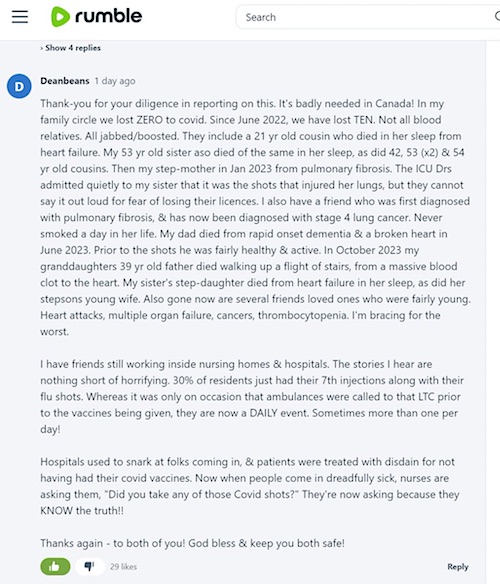
From the comments on the Mark Crispin Miller article.

X thread.
• Pfizer Seeks To Treat Most TURBO CANCERS Caused By mRNA Vaccines (Makis)
Pfizer completes $43 Billion acquisition of Seagen on Dec.14, 2023 – becomes largest oncology company to treat most TURBO CANCERS caused by mRNA Vaccines – deep dive into the sinister aspects of this very bizarre deal. Pfizer OVERPAYS $43 billion on small Cancer Drug Company that barely makes $2 billion a year. Pfizer doesn’t need the cash. It will also issue $31 billion in debt to purchase it. Everyone is taking this at face value. But something very sinister lurks in the details of this deal. Pfizer (and Moderna) COVID-19 mRNA Vaccines cause Turbo Cancers. Based on my published description of 100s of Turbo Cancer cases in over 30 articles: Here are the Top 5 Turbo Cancers we will see by numbers in mRNA Vaccinated people:
• Lymphoma (various types) • Brain Cancers (mostly glioblastoma) • Breast Cancer (mostly triple negative, Stage 3/4) • Colon Cancer (Stage 4) • Lung Cancer (Stage 4). Rounding out the Top 10 Turbo Cancers by # of people affected (no particular order): • leukemias (worst prognosis) • melanomas (Stage 4) • sarcomas (Stage 3,4) • testicular/ovarian (rapid progression, Stage 1-4) • kidney (RCC Stage 4). Pfizer’s new acquisition takes them from being able to treat 2 of these Turbo Cancers, to being able to treat 7 out of 10. Not bad. But there’s more. Pfizer CEO Albert Bourla did a media interview tour about the $43 Billion Cancer drug deal and this is what he has to say:
– 33% of people WILL get cancer (he’s certain)
– entire families WILL be affected (he’s certain)
– The new cancer treatments are like “missiles” that will target “most” cancers
– he will produce them AT A SCALE THAT HAS NOT BEEN SEEN BEFORE.
– 2025
– “We have a Global Network”
– ” we have very quick way of completing clinical trials”
– will be produced “AT SCALE”, “just like mRNA”Think about what he is telegraphing. Read the above again. Why would any company need to produce cancer treatments “AT SCALE”? Seeking Alpha analysis theorizes it would take Pfizer at least a decade just to break even from this deal. Financially, this $43 billion Acquisition makes NO SENSE for Pfizer. Unless something else happens…





Be kind
https://twitter.com/i/status/1736743114524520451

https://twitter.com/i/status/1737001536591462815



Lucky chops
https://twitter.com/i/status/1736821687411257744

China students
Every university freshman in China will have to pass gruelling military training before embarking on their years of study.
This is a group of uniform-donning freshmen at Northwest University in Xi'an, doing a human countdown from nine to one [timelapse]pic.twitter.com/bT3iJFIrtc
— Massimo (@Rainmaker1973) December 18, 2023


Support the Automatic Earth in wartime with Paypal, Bitcoin and Patreon.




